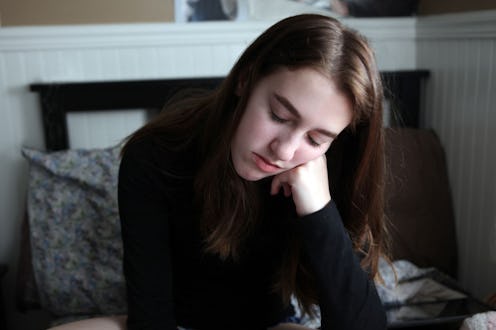Life
The Right Breakfast After A Bad Night's Sleep Legit Changes Everything

Good news, I think I have finally found the perfect formula for the best breakfast after a bad night's sleep. That morning pick-me-up after a restless night is the holy grail of morning meals, and after much deliberation (and a bit of personal trial and error), I think I've cracked it. But, I regret to inform you, it doesn't come in the form of a cinnamon bun.
If you have a snoring partner, a noisy neighbour, a Netflix addiction, or a habit of drinking a little too much wine before bed, then nights of little to no sleep will be a familiar story. The following morning, you're bleary-eyed, groggy, and irritable. You're putting orange juice in your coffee, and catching yourself in the mirror at work, thinking: "This is what I chose to wear this morning? Really?" Plus, any notions of hitting the gym go completely out of the window. If you're anything like me, you probably have a go-to breakfast for mornings such as these — mine usually constitute a sweet coffee and a Pret cheesy croissant — but what if you've been getting it all wrong? Is this really the way to boost your energy levels after a bad night's sleep?
To answer that question, let's start with a look at the science. According to a study in the Journal of Clinical Endocrinology & Metabolism, even one night of poor sleep can have a negative impact on the body's metabolism. The study found that this can result in "ill health alongside significant reductions in body weight, leading to major organ dysfunction and in some cases death."
Amy Jamieson-Petonic, spokeswoman for the Academy of Nutrition and Dietetics, opened up about the research to Fitness magazine. She explained that the poor health created by lack of sleep is due to "hormones that go haywire with too little slumber." Leptin, which decreases appetite, ghrelin, which increases cravings, and cortisol, which affects fat storage, are all completely thrown out of whack following a night of no sleep.
So what does that all mean? Well, I'm afraid it's really the opposite of what you want to hear. Step away from the Frappuccinos, the cookies, and the croissants — seductive though they might be — as the increased effort it takes for your body to digest high-sugar, high-carbohydrate foods leaves you feeling even more lethargic. And while you might feel an initial hit of energy, it will inevitably be followed by a crash that will leave you feeling worse than you did before.
Instead, aim for a mix of complex carbohydrates and protein, for example a bowl of porridge and a banana, or peanut butter on wholegrain toast. The Daily Meal advises keeping it as simple as possible in a bid to fight off fatigue, with a small portion of eggs on toast. The small portion won't put too much pressure on your digestive system, while the eggs contain protein and B-vitamins — essential for converting food into energy — which will keep you feeling energised until lunchtime.
Lauren Antonucci, director of Nutrition Energy in New York City, agrees. She told Fitness magazine: "[Eggs are] one of the most absorbable types of protein, with just the right amount of fats and a dose of energy-boosting B-vitamins."
So what else is key? Well, water for one. Antonucci told the same title that non-sleepers should aim to "down two glasses of water first thing," and then "sip half your body weight in fluid ounces by bedtime." One cup of coffee is also a good thing for that initial energy surge, but be wary of overdoing it, otherwise you will face that dreaded crash at around 11 a.m.
Take comfort in the fact that a bad night's kip doesn't have to mean a nightmare day. A cup of Joe and a nutritious breakfast, and you'll be right as rain in no time.